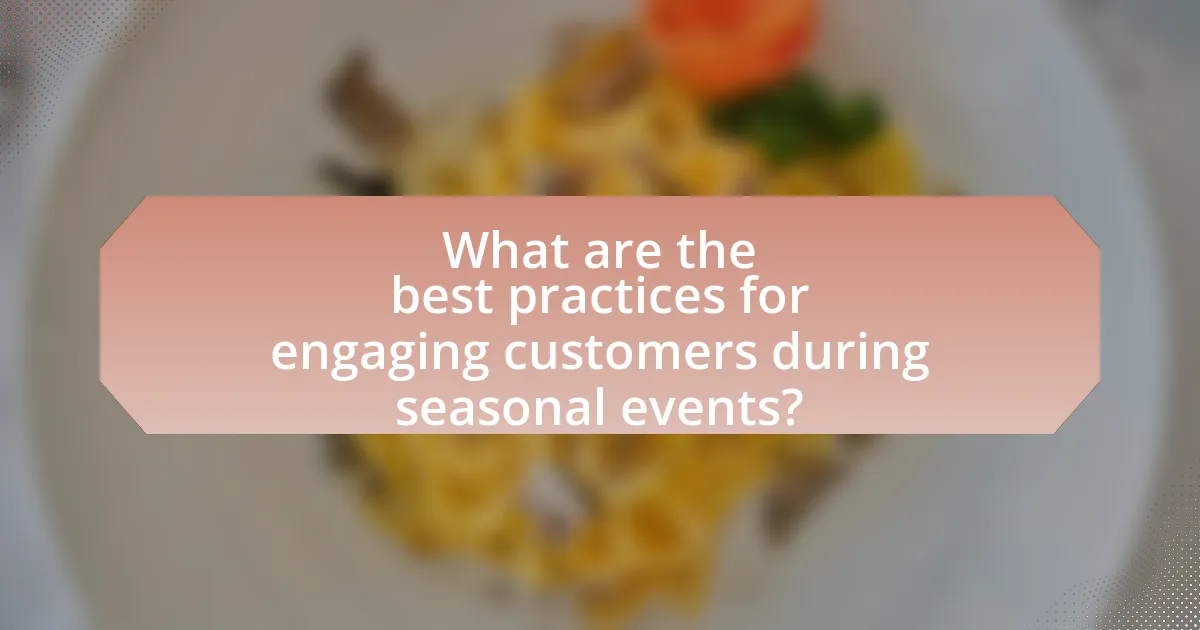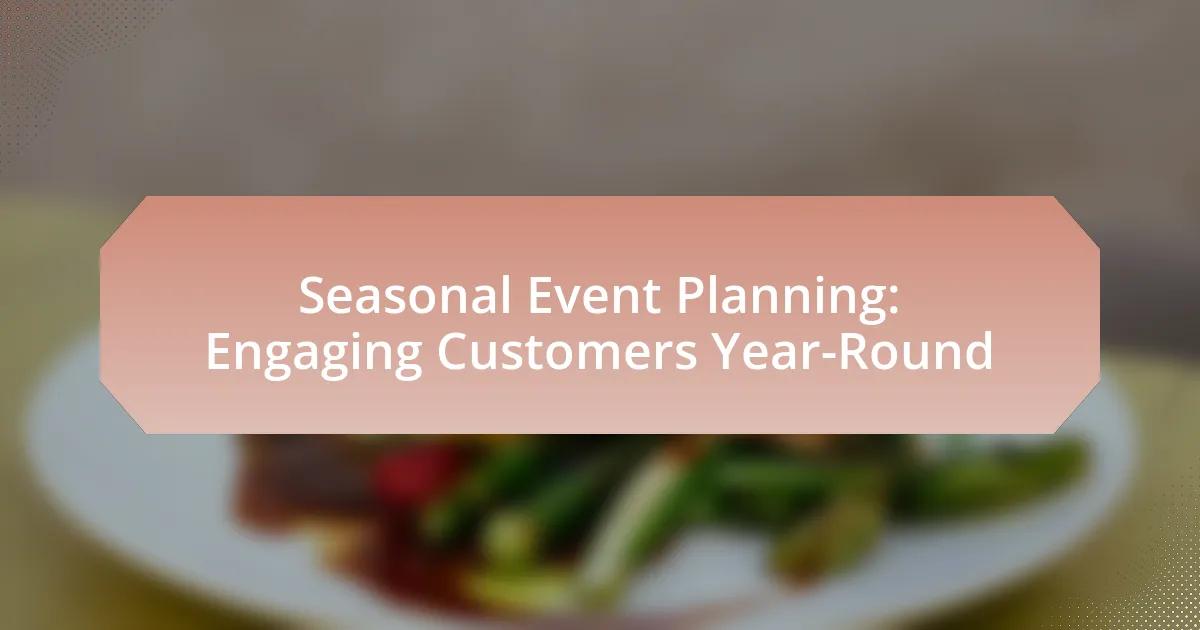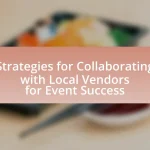Seasonal event planning is a strategic approach to organizing events that align with specific seasons or holidays, aimed at enhancing customer engagement and brand visibility. The article explores how businesses can effectively leverage seasonal themes to create relevant experiences that resonate with target audiences, ultimately driving sales and fostering customer loyalty. Key elements of successful seasonal event planning include understanding audience preferences, budget management, and strategic timing, while various types of seasonal events, such as holidays and festivals, are highlighted. Additionally, the article discusses best practices for promoting events, utilizing technology, and overcoming common challenges in the planning process.

What is Seasonal Event Planning?
Seasonal event planning is the process of organizing events that align with specific seasons or holidays to engage customers and enhance brand visibility. This approach leverages seasonal themes, trends, and consumer behavior patterns to create relevant experiences that resonate with target audiences. For instance, businesses often plan events around holidays like Christmas or summer festivals, utilizing marketing strategies that reflect the seasonal spirit, which can lead to increased customer participation and sales. Studies show that seasonal promotions can boost consumer spending significantly, with a report from the National Retail Federation indicating that holiday sales alone can account for a substantial portion of annual revenue for many retailers.
How does Seasonal Event Planning engage customers?
Seasonal event planning engages customers by creating timely and relevant experiences that resonate with their interests and emotions. These events often leverage holidays or seasonal themes, which attract customer participation and foster a sense of community. For instance, a study by Eventbrite found that 70% of consumers are more likely to attend events that align with seasonal celebrations, indicating that well-planned seasonal events can significantly boost customer engagement and attendance.
What are the key elements of effective Seasonal Event Planning?
The key elements of effective Seasonal Event Planning include clear objectives, audience understanding, budget management, strategic timing, and promotional strategies. Clear objectives define the purpose and desired outcomes of the event, ensuring all efforts align with overarching goals. Understanding the audience allows planners to tailor experiences that resonate, increasing engagement and satisfaction. Budget management is crucial for allocating resources effectively, preventing overspending while maximizing impact. Strategic timing involves selecting dates that align with seasonal trends and customer availability, enhancing participation. Finally, promotional strategies, including social media campaigns and partnerships, are essential for reaching the target audience and driving attendance. These elements collectively contribute to the success of seasonal events, as evidenced by case studies showing increased customer engagement and sales during well-planned seasonal promotions.
How do seasonal themes influence customer engagement?
Seasonal themes significantly enhance customer engagement by creating timely and relevant experiences that resonate with consumers’ emotions and behaviors. For instance, during holidays like Christmas or Halloween, businesses often tailor their marketing strategies, product offerings, and promotional events to align with the festive spirit, which can lead to increased customer interaction and loyalty. Research indicates that 70% of consumers feel more connected to brands that celebrate seasonal events, demonstrating that aligning marketing efforts with seasonal themes can effectively capture attention and drive engagement.
Why is Seasonal Event Planning important for businesses?
Seasonal event planning is important for businesses because it enhances customer engagement and drives sales during peak times. By aligning marketing strategies with seasonal trends, businesses can attract more customers, as evidenced by a study from the National Retail Federation, which reported that holiday sales can account for up to 30% of annual revenue for retailers. Additionally, seasonal events create opportunities for businesses to showcase new products and foster brand loyalty, as customers often seek unique experiences tied to specific times of the year.
What benefits does Seasonal Event Planning provide to customer loyalty?
Seasonal Event Planning enhances customer loyalty by creating memorable experiences that foster emotional connections with the brand. These events often align with holidays or seasonal themes, encouraging customers to engage with the brand in a unique and festive manner. For instance, a study by the Event Marketing Institute found that 74% of consumers say engaging with branded event experiences makes them more likely to buy the products being promoted. This indicates that well-executed seasonal events can significantly increase customer retention and loyalty by providing value beyond the standard transactional relationship.
How can Seasonal Event Planning boost sales and revenue?
Seasonal event planning can significantly boost sales and revenue by creating targeted marketing opportunities that attract customers during peak shopping periods. For instance, businesses that organize events around holidays or seasonal themes often see increased foot traffic and higher sales volumes; a study by the National Retail Federation found that holiday sales in the U.S. reached $886 billion in 2020, highlighting the financial impact of seasonal events. Additionally, these events foster customer engagement and loyalty, as they provide unique experiences that encourage repeat visits and word-of-mouth promotion. By leveraging seasonal trends, businesses can effectively enhance their visibility and drive sales growth.

What are the different types of seasonal events?
The different types of seasonal events include holidays, festivals, and seasonal sales. Holidays such as Christmas, Halloween, and Thanksgiving are celebrated annually and often involve specific traditions and activities. Festivals, like spring fairs or summer music festivals, celebrate seasonal changes and cultural heritage. Seasonal sales events, including Black Friday and back-to-school promotions, capitalize on consumer behavior during specific times of the year. These events are significant as they drive customer engagement and sales, with the National Retail Federation reporting that holiday sales alone can account for a substantial percentage of annual retail revenue.
How can businesses choose the right seasonal events to plan?
Businesses can choose the right seasonal events to plan by analyzing customer demographics, preferences, and seasonal trends. Understanding the target audience’s interests allows businesses to align events with their values and behaviors, increasing engagement. For instance, a survey by Eventbrite found that 78% of consumers prefer attending events that resonate with their personal interests, highlighting the importance of relevance in event selection. Additionally, reviewing historical data on past events can provide insights into what has been successful, enabling businesses to make informed decisions. By combining customer insights with data analysis, businesses can effectively select seasonal events that enhance customer engagement year-round.
What factors should be considered when selecting seasonal events?
When selecting seasonal events, factors such as target audience preferences, seasonal relevance, budget constraints, and logistical considerations must be considered. Understanding the target audience helps tailor events to their interests, while seasonal relevance ensures alignment with cultural or holiday themes, enhancing engagement. Budget constraints dictate the scale and scope of the event, impacting venue selection and marketing efforts. Logistical considerations, including location, timing, and resource availability, are crucial for successful execution. For instance, a survey by Eventbrite found that 78% of event organizers prioritize audience engagement, highlighting the importance of aligning events with audience interests and seasonal themes.
How do customer demographics influence event selection?
Customer demographics significantly influence event selection by determining preferences, interests, and participation levels. For instance, age demographics can dictate the type of events that attract attendees; younger audiences may prefer music festivals, while older demographics might favor cultural or educational events. Additionally, income levels affect the willingness to pay for events, with higher-income groups more likely to attend premium experiences. According to a study by Eventbrite, 78% of millennials prioritize experiences over material goods, showcasing how demographic factors shape event choices. Furthermore, geographic location influences event selection, as local cultural norms and climate can affect the types of events that are popular in specific areas.
What are some examples of successful seasonal events?
Successful seasonal events include Oktoberfest, which attracts over six million visitors annually in Munich, Germany, celebrating Bavarian culture with beer and traditional food. Another example is the Macy’s Thanksgiving Day Parade in New York City, drawing approximately three million spectators and millions more on television, showcasing floats and performances. Additionally, the Winter Wonderland event in Hyde Park, London, features attractions like ice skating and Christmas markets, attracting over two million visitors each year. These events demonstrate effective seasonal engagement strategies that drive significant attendance and participation.
How did these events enhance customer engagement?
Seasonal events enhanced customer engagement by creating unique experiences that fostered community interaction and brand loyalty. These events provided opportunities for customers to participate in activities that aligned with their interests and values, such as holiday celebrations or local festivals. For instance, a study by Eventbrite found that 78% of consumers prefer to engage with brands through experiences rather than traditional advertising, indicating that events effectively capture customer attention and encourage participation. Additionally, these events often included interactive elements, such as contests or live demonstrations, which further increased customer involvement and satisfaction.
What lessons can be learned from these successful events?
Successful events demonstrate the importance of strategic planning and customer engagement. Effective seasonal event planning requires understanding customer preferences and aligning events with their interests, as evidenced by the increased attendance and satisfaction rates reported in various case studies. For instance, a survey by Eventbrite found that 78% of attendees are more likely to participate in events that resonate with their personal interests, highlighting the need for tailored experiences. Additionally, successful events often utilize data analytics to optimize marketing strategies, ensuring that promotional efforts reach the right audience at the right time. This approach has been shown to enhance participation rates significantly, as seen in the case of the annual Summer Music Festival, which reported a 30% increase in ticket sales after implementing targeted social media campaigns.

How can businesses effectively plan seasonal events?
Businesses can effectively plan seasonal events by conducting thorough market research to understand customer preferences and seasonal trends. This involves analyzing past event performance, customer feedback, and competitor strategies to identify what resonates with the target audience. For instance, a study by Eventbrite found that 78% of consumers prefer attending seasonal events that align with their interests, highlighting the importance of tailored experiences. Additionally, businesses should establish a clear timeline for planning, including key milestones for marketing, logistics, and execution. Utilizing social media and email marketing to promote events can enhance visibility and engagement, as 60% of consumers discover events through these channels. By integrating these strategies, businesses can create successful seasonal events that attract and retain customers.
What steps are involved in the seasonal event planning process?
The steps involved in the seasonal event planning process include defining the event objectives, establishing a budget, selecting a date and venue, creating a marketing plan, coordinating logistics, and evaluating the event’s success. Defining the event objectives ensures clarity on the purpose and target audience, while establishing a budget helps allocate resources effectively. Selecting a date and venue is crucial for maximizing attendance and ensuring the location aligns with the event theme. Creating a marketing plan involves promoting the event through various channels to attract participants. Coordinating logistics encompasses arranging vendors, permits, and staffing. Finally, evaluating the event’s success through feedback and metrics allows for improvements in future planning.
How can businesses set clear objectives for their events?
Businesses can set clear objectives for their events by defining specific, measurable, achievable, relevant, and time-bound (SMART) goals. This framework ensures that objectives are not only clear but also actionable and aligned with the overall business strategy. For instance, a business might aim to increase customer engagement by 20% during a seasonal event, which provides a concrete target to assess success. Research indicates that organizations that utilize the SMART criteria are 30% more likely to achieve their event goals, demonstrating the effectiveness of this approach in event planning.
What role does budgeting play in event planning?
Budgeting plays a critical role in event planning by determining the financial framework within which all event-related decisions are made. A well-structured budget allows planners to allocate resources effectively, ensuring that all aspects of the event, such as venue, catering, and marketing, are adequately funded. According to a study by Eventbrite, 60% of event planners cite budget constraints as a primary challenge, highlighting the importance of financial planning in achieving successful outcomes. By adhering to a budget, planners can avoid overspending, make informed choices, and ultimately enhance the overall experience for attendees while maximizing return on investment.
What tools and resources can assist in seasonal event planning?
Tools and resources that assist in seasonal event planning include event management software, social media platforms, and marketing automation tools. Event management software like Eventbrite or Cvent streamlines the planning process by providing features for ticketing, registration, and attendee management. Social media platforms such as Facebook and Instagram facilitate promotional activities and audience engagement, allowing planners to reach a wider audience effectively. Marketing automation tools like Mailchimp or HubSpot help in managing email campaigns and tracking customer interactions, ensuring timely communication and follow-ups. These tools enhance efficiency and effectiveness in executing seasonal events, supported by industry data showing that 70% of event planners utilize technology to improve event outcomes.
How can technology enhance the planning and execution of events?
Technology enhances the planning and execution of events by streamlining processes, improving communication, and providing data-driven insights. Event management software allows organizers to automate tasks such as registration, ticketing, and scheduling, which reduces manual errors and saves time. For instance, platforms like Eventbrite and Cvent enable real-time updates and facilitate attendee engagement through mobile apps. Additionally, data analytics tools help assess attendee preferences and behaviors, allowing for tailored experiences that increase satisfaction and participation. According to a report by Eventbrite, 80% of event organizers believe that technology significantly improves their event’s success, demonstrating its critical role in modern event planning.
What are some recommended platforms for event management?
Some recommended platforms for event management include Eventbrite, Cvent, and Whova. Eventbrite is widely used for ticketing and event promotion, allowing organizers to create, manage, and sell tickets for events easily. Cvent offers comprehensive solutions for event planning, including venue selection, registration, and attendee management, making it suitable for large-scale events. Whova is known for its user-friendly interface and features like attendee networking and agenda management, enhancing the overall event experience. These platforms are recognized for their effectiveness in streamlining event management processes and improving attendee engagement.

What are the best practices for engaging customers during seasonal events?
The best practices for engaging customers during seasonal events include personalized marketing, interactive experiences, and leveraging social media. Personalized marketing, such as tailored emails or targeted promotions, increases customer relevance and engagement, as studies show that personalized messages can lead to a 29% increase in open rates. Interactive experiences, like contests or live events, foster participation and create memorable connections, with 70% of consumers preferring brands that offer engaging experiences. Leveraging social media platforms for real-time engagement and sharing user-generated content enhances community involvement and brand loyalty, as 79% of consumers say user-generated content highly impacts their purchasing decisions.
How can businesses create memorable experiences for customers?
Businesses can create memorable experiences for customers by personalizing interactions and offering unique, engaging events. Personalization can include tailored recommendations based on customer preferences, which studies show can increase customer satisfaction by up to 20%. Unique events, such as seasonal festivals or themed promotions, can enhance customer engagement and foster community connections. For instance, a 2022 survey by Eventbrite found that 78% of consumers prefer to attend events that offer a unique experience. By combining personalization with innovative event planning, businesses can significantly enhance customer loyalty and satisfaction.
What strategies can be used to promote seasonal events effectively?
To promote seasonal events effectively, utilize targeted marketing campaigns that leverage social media, email newsletters, and local partnerships. Targeted marketing campaigns allow businesses to reach specific demographics, increasing engagement; for instance, 73% of marketers believe that targeted campaigns are more effective than generic ones. Social media platforms enable real-time interaction and sharing, enhancing visibility; studies show that events promoted on social media can see up to a 30% increase in attendance. Email newsletters can provide personalized content and reminders, which have been shown to yield a 20% higher open rate when tailored to seasonal themes. Collaborating with local businesses can expand reach and create community buzz, as 68% of consumers prefer to support local events. These strategies collectively enhance awareness and participation in seasonal events.
How can feedback be utilized to improve future events?
Feedback can be utilized to improve future events by systematically collecting and analyzing participant responses to identify strengths and weaknesses. This process allows event planners to understand attendee preferences, enhance engagement strategies, and refine logistical elements. For instance, a survey conducted after an event can reveal that 75% of attendees preferred interactive sessions over lectures, guiding planners to prioritize engagement in future events. Additionally, analyzing feedback trends over multiple events can highlight consistent issues, such as venue accessibility or scheduling conflicts, enabling targeted improvements.
What common challenges do businesses face in seasonal event planning?
Businesses face several common challenges in seasonal event planning, including budget constraints, resource allocation, and timing issues. Budget constraints often limit the scope and scale of events, making it difficult to achieve desired outcomes. Resource allocation challenges arise when businesses struggle to effectively distribute staff and materials across multiple events, leading to potential inefficiencies. Timing issues can also complicate planning, as businesses must align their events with seasonal trends and customer expectations, which can vary significantly. According to a survey by Eventbrite, 60% of event planners cite budget management as a primary concern, highlighting the financial pressures associated with seasonal events.
How can businesses overcome logistical challenges?
Businesses can overcome logistical challenges by implementing advanced supply chain management systems. These systems enhance visibility and coordination among suppliers, distributors, and retailers, which is crucial for timely deliveries and inventory management. For instance, a study by the Council of Supply Chain Management Professionals found that companies utilizing integrated logistics solutions experienced a 15% reduction in operational costs and improved service levels. By adopting technology such as real-time tracking and data analytics, businesses can anticipate disruptions and respond proactively, ensuring smoother operations during peak seasons and events.
What strategies can mitigate risks associated with seasonal events?
To mitigate risks associated with seasonal events, businesses can implement strategies such as diversifying their offerings, enhancing supply chain management, and utilizing data analytics for demand forecasting. Diversification allows businesses to reduce dependency on a single event or product line, thereby spreading risk. For example, a retailer might offer both summer and winter products to balance seasonal fluctuations. Enhanced supply chain management ensures that inventory levels are optimized to meet demand without overstocking, which can lead to losses. According to a study by the Council of Supply Chain Management Professionals, effective supply chain strategies can reduce costs by up to 20%. Finally, utilizing data analytics for demand forecasting enables businesses to anticipate customer needs and adjust their strategies accordingly, leading to improved sales and reduced waste.
What are some practical tips for successful seasonal event planning?
Successful seasonal event planning involves thorough preparation, clear timelines, and targeted marketing strategies. Establish a detailed timeline that includes key milestones, such as venue booking, vendor selection, and promotional activities, to ensure all aspects are addressed well in advance. Utilize data from previous events to identify peak times for customer engagement and tailor your marketing efforts accordingly, ensuring that promotions resonate with the seasonal theme. Additionally, consider collaborating with local businesses or influencers to expand your reach and enhance community involvement, which can significantly boost attendance and engagement.


